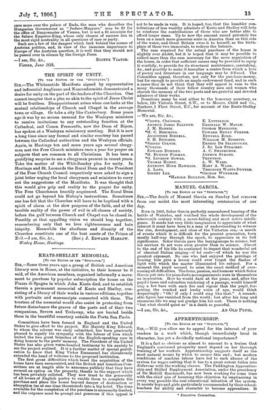THE SPIRIT OF UNITY.
[TO THU EDITOR OF Tam "SpBorkron.1 Snt,—The Whitsuntide Manifesto signed by representative and influential Anglicans and Nonconformists demonstrated a desire for unity on the part of the leaders of the Churches. One cannot imagine that a plea so akin to the spirit of Jesus Christ will be fruitless. Disappointment arises when one looks at the 'Mutual relationships of Church and Chapel in the average town or village. Or take a city like Canterbury. Some years ago it was by no means unusual for the Wesleyan ministers to receive invitations to any outstanding function at the Cathedral, and Canon Fremantle, now the Dean of Ripon, has spoken at a Wesleyan missionary meeting. But it is now a long time sincesany formal and similar courtesy has passed between the Cathedral authorities and the Wesleyan officials. Again, in Hastings ten and more years ago several clergy- men met the Free Church ministers once a year for prayer on subjects that are common to all Christians. It has been a gratifying surprise to see a clergyman present in recent years. Take the matter of the Whit-Sunday plea for unity. In Hastings and St. Leonards the Rural Dean and the President of the Free Church Council respectively were asked to sign a joint letter urging the local clergymen and ministers to carry out the suggestions of the Manifesto. It was thought that this would give grip and reality to the prayer for unity. The Free Churchman heartily acquiesced. The Rural Dean could not go beyond his Bishop's instructions. Sometimes one has felt that the Churches will have to be baptised with a spirit of alarm at the slow progress ef the faith, and at the terrible reality of the power of evil in all classes of society, before the gulf between Church and Chapel can be closed in. Possibly at that appalling vision we should leap together, remembering only that we love righteousness and hate iniquity. Meanwhile the aloofness and disunity of the Churches constitute one of the best assets of the Prince of


















































 Previous page
Previous page